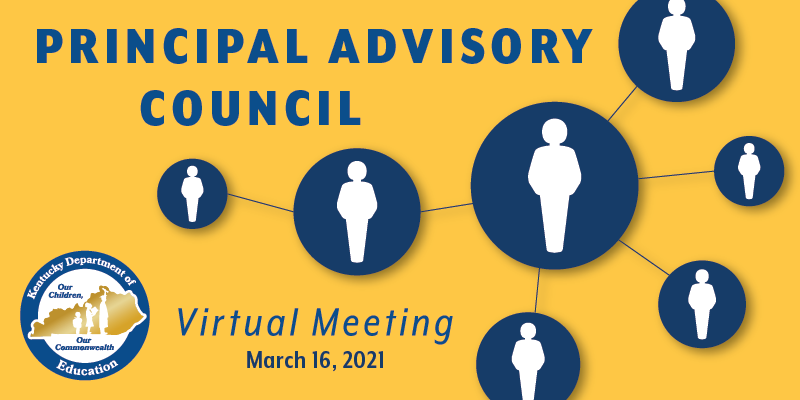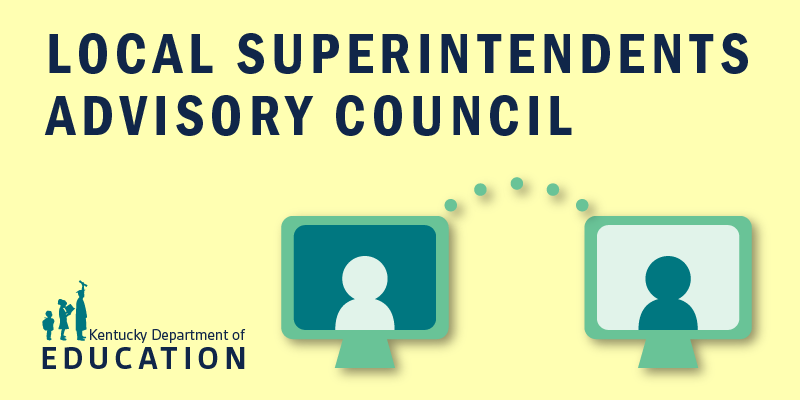 The Kentucky Department of Education’s (KDE’s) Principals Advisory Council (PrAC) heard about the school counselor’s role in providing social-emotional support for students during its meeting on March 16.
The Kentucky Department of Education’s (KDE’s) Principals Advisory Council (PrAC) heard about the school counselor’s role in providing social-emotional support for students during its meeting on March 16.
Damien Sweeney, program coordinator for comprehensive school counseling in KDE’s Office of Teaching and Learning, presented “The Kentucky Framework of Best Practices for School Counselors,” which was released in July 2020 to provide updated guidance for Kentucky school counselors.
The framework also is meant to help school counselors build their capacity for helping students by improving their knowledge of their professional responsibilities; growing their leadership and advocacy skills; and implementing a comprehensive school counseling program, with the framework as their guide.
“Part of this work is to make sure we’re aligned and we’re going in the same direction” to support students, Sweeney said.
The document clarifies for administrators how the counselor should be utilized within the schools. It is recommended that districts employ at least one school counselor in each school, with the goal being for the school counselor to spend at least 60% of their time providing counseling and related services directly to students.
One of these services can be social and emotional learning. During the meeting, Sweeney led the principals in a social-emotional lesson plan that modeled social-emotional learning, having participants name cognitive distortions with which they identify. These cognitive distortions include all-or-nothing thinking, emotional reasoning, overgeneralization and catastrophizing.
“When [school counselors] are able to get in the classroom and do whole group lessons,” Sweeney said, “they are able to normalize the things that our students are going through.”
Supporting diversity, equity and inclusion
Thomas Woods-Tucker, KDE’s chief equity officer and deputy commissioner in the Office of Teaching and Learning, gave a presentation on how KDE is supporting districts as they work to improve equity and inclusion in schools. KDE has several ongoing initiatives, including the Kentucky Academy for Equity in Teaching (KAET), Kentucky Academic Standards implementation to ensure equitable access to appropriate grade-level learning for all students, and an equitable practices and policy scan.
Of the responses received from the scan so far, nearly 55% of respondents said they did not currently have an equity and inclusion plan. Over 51% said equity is included in their district’s strategic plan.
KDE also is developing an equity dashboard for schools to reference. Sweeney asked the council to provide feedback on a draft of that dashboard.
Toyah Robey, principal of Kentucky School for the Blind, said the dashboard is an “excellent tool to gauge our campus equity, inclusivity and diversity.”
Kym Rice, principal at Shawnee High School (Jefferson County), said “I love that this data will be easily accessible.”
The equity dashboard is part of KDE’s ongoing equity-related initiative to support districts in ensuring equity and inclusion in schools.
Regulation updates
Matthew Courtney of KDE’s Office of Continuous Improvement and Support presented information on slight amendments to 701 KAR 5:100, Guidelines for Alternative Models for School-based Decision Making (SBDM).
Although there is no significant change to the regulation, there are two key policy changes. One creates a more formal timeline for the creation and submission of an alternative model application. The other clarifies that applications for alternative SBDM models are not required for changes that maintain the statutorily required membership ratios or that add non-voting members.
PrAC also discussed changes to 703 KAR 5:225, a regulation related to Comprehensive School and District Improvement Planning. The minor updates are designed to reduce future regulatory burden.




Leave A Comment